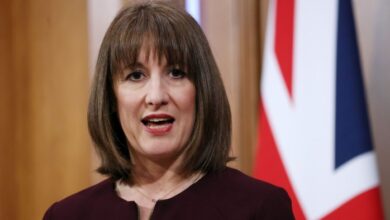BP pivots back to oil and gas after ‘misplaced’ faith in green energy

Unlock the Editor’s Digest for free
Roula Khalaf, Editor of the FT, selects her favourite stories in this weekly newsletter.
BP has abandoned a radical attempt to reinvent itself as a green energy company, bowing to pressure from investors after its aggressive shift away from fossil fuels over the past five years backfired.
In a return to its roots, the FTSE 100 group said on Wednesday that it would increase oil and gas spending by a fifth to $10bn a year and cut expenditure on renewables by 70 per cent.
Chief executive Murray Auchincloss said the change was a “fundamental reset of BP’s strategy”, as he ditched targets to cut fossil fuel production and develop 50 gigawatts of renewable power.
Auchincloss, who took over on a permanent basis in January 2024, said the company had been too optimistic in its decision to pivot more aggressively than its rivals towards green energy.
“Our optimism for a fast transition was misplaced and we went too far too fast,” he said as he announced the new strategy following pressure from activist investor Elliott Management. “Oil and gas will be needed for decades to come.”
He killed off a five-year-old strategy that had established BP as a leader in the energy transition but ultimately failed to win shareholder support after years of lacklustre returns.
Under Auchincloss’s plan, BP will attempt to raise at least $20bn by 2027 through the sale of assets, potentially including its lubricants arm Castrol and a share of its solar business Lightsource.
Shareholder pressure on Auchincloss to revamp BP’s strategy had increased after it emerged this month that Elliott had built a near-5 per cent stake in the £72bn company and was pushing for change.
BP’s shares fell 2.3 per cent after it published its strategy update on Wednesday, in a sign that investors remained uncertain over whether the announcements went far enough.
“We put a ton of information out there, [investors] will need to interpret that and understand it. And then I expect the share price to start moving up over the coming weeks and months,” said Auchincloss.
Auchincloss said he expected a “pretty high growth rate” for BP’s upstream business and planned to launch as many as 27 new projects in the next five years as the company rebuilds oil production capacity after years of trimming its output. “We’ve got 16 billion barrels to pursue,” he said.
But BP will still produce slightly less oil and gas in 2030 than it did in 2019 and Auchincloss said the group had not abandoned its plans to be a diversified energy company. “I don’t really see anybody else doing any more than we’re doing at this type of scale,” he said. “You will see no better-integrated energy company in the world than BP.”
In a total reset of BP’s financial outlook, Auchincloss signalled a lower rate of shareholder returns, but promised to cut at least $4bn of costs and reduce net debt by at least a fifth in the next two years.
Auchincloss said there were “lots of options” to achieve his aim of raising $20bn by selling parts of the business, including infrastructure, upstream and downstream assets and some of its petrol station network.
Biraj Borkhataria, an analyst at RBC Capital Markets, said that while BP appeared to be making “the right calls for the long term, it may not please investors today”.
https://www.ft.com/__origami/service/image/v2/images/raw/https%3A%2F%2Fd1e00ek4ebabms.cloudfront.net%2Fproduction%2F9ade890a-6ac7-439c-b73f-43420ba3503c.jpg?source=next-article&fit=scale-down&quality=highest&width=700&dpr=1
2025-02-26 09:12:32




